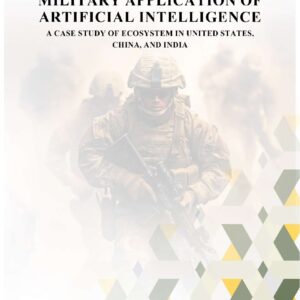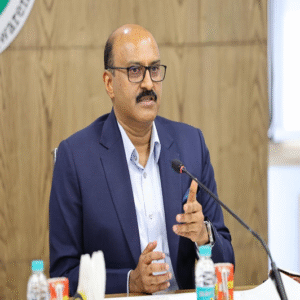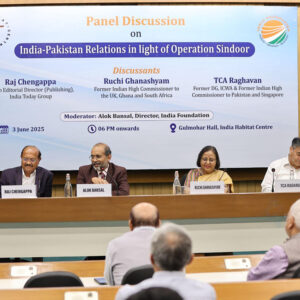The discussion on state and non-state actors of global terror was an effort by the India Foundation to bring on a common platform people who have been relentlessly fighting this demon and have them share their views.
The speakers at the event were Shri Tarek Fatah, Canadian writer, broadcaster and an activist. He has authored books like Chasing a Mirage: The Tragic Illusion of an Islamic State and The Jew Is Not My Enemy: Unveiling the Myths that Fuel Muslim Anti-Semitism. Shri M J Akbar, leading Indian journalist and author. He has written several non-fiction books, including Byline , Nehru: The Making of India, Kashmir: Behind the Vale etc. and Dr. Chandan Mitra- MP (RS) and Director, India Foundation. Also present to share her vast experience was Dr. Najma Heptulla- MP(RS) and Vice President (Bhartiya Janta Party).
Explaining her commitment to the anti-terror campaign, Dr. Najma Heptulla told the audience how her Grandfather Shri Maulana Abul Kalam Azad was strictly against partition and more so partition on the basis of religion. She said that Maulana Azad had the foresight to see that nation’s partition on the basis of religion would put a bad precedence in place. In 1947 India got divided, in 1948 Palestine and this way a movement started. Whether it is Bosnia, Chechnya, South Sudan or East Timor, the movement seems to attack all multi-religious societies.
Dr. Heptulla also expressed her worries and reservations with regard to Pakistan, especially after withdrawal of NATO forces from Afghanistan.
Shri Tarek Fatah started his address by mentioning about his book ‘Jinnah’s Orphans’. He said a lot of blame of the blame lay on the victims of terrorism, who are reluctant to call spade a spade. Terrorism by its very nature is not new. 19th century was full of terrorism in Europe by anarchists; French revolution was filled with the massacres of the French Nobility; then there was Subhash Chandra Bose’s ideas of fighting for revolution; Parliament at Lahore was attacked; Bhagat Singh and many others. He points out that the difference is that all these instances, whether we agree with their purpose or not, had the program of establishing something for an idea or a nation-state.
He reiterated that terrorism is not new, but that what has happened, and what is different is now is that there is Islamic Terrorism. There is a reluctance to call it that, and therefore he said, we lose our ability to address the problem. He further argued that if a Kashmiri wants separation, he is demanding, whether you like it or not, an independent Kashmiri state. If somebody is fighting for the liberation of India whether it is Bhagat Singh, he is giving his life for something. Today we are facing scourge in which objective is mere death itself. While stating that most instances of terrorism over the past twenty years have had their roots in Pakistan, Mr. Fatah pointed out the need to then address the question as to why such roots of terror are not unearthed ined in Iran or Turkey or Indonesia; “Are they less of Muslims?” he asked. He continued, “I haven’t heard of others, in fact the first Palestinian that I have of in international terrorism is the Toronto guy. These fellows are pursuing a political ideology which, I am afraid is a death cult.” He firmly states that unless we address it specifically instead of going through the route of asking the question as regards the roots of such terror. He said that if Obama has the audacity to say “we are trying to understand what is its root cause” then Obama himself is complicit in the act of terror; the inability to speak the truth with clarity at a time of war is an act of betrayal.
Further, he went on to call the 2008 attack on Mumbai as an act of war, and not an act of terrorism. He stressed especially that the attack of the Indian Parliament was an act of war by the Islamic Republic of Pakistan. He stated that it is the inability of India to respond is what is fuelling this terrorism.
There is an inability, he felt, to stand up and speak the truth for fear of being called Right Wing or a member of the RSS or the BJP and for simply saying that the attack on Mumbai is act of war.
Mr. Fatah further elaborated that in Pakistan today there is the Baluchistan war, which is never read about in the Indian press, whether it is in the Right wing or Left wing; “I don’t even hear about it as if that part of the world was never part of India…There seems to be concerned only about General Musharraf and Imran Khan, not for the North West Frontier Province which is Khyber Pakhtunkhwa, which is where Khan Abdul Gaffar Khan came from, that’s where the Congress won and that’s where people are being assassinated everyday by the Taliban and that is where the forthcoming elections will be determined. Not what happens in Pakistan but if the secular nationalist government of Awami National Party is stopped over there. What happens in the elections at Baluchistan, 10,000 guerrilla fighters under an urban middle class Dr. Allah Nazar fighting and we have the port of Gwadar sold to the Government of China.”
The problem then, he stated is that in a democracy where one can speak, nobody speaks that the Ambassador of High Commission of India in Bangladesh was attacked. If the American Ambassador to Bangladesh had been attacked, it would get worldwide coverage!
Further along the discussion, Mr. Fatah referred to the Shahbhag protests, asking the audience as to where the people of Shahbag and Dhaka would go when they go around and look war criminals walking across. He answered in exclamation that the only place they can look for is India and in Kolkata you have 50,000 people coming out to support the Jamaat-e-Islami. Where is Jyoti Basu and his thirty year old communist regime, while all this is happening, he wondered.
Acts of terror are, he felt, being committed by not non-state actors. They are being funded by the United States of America somehow knowingly or unknowingly; there’s billions of dollars pouring into such activities in Pakistan, he said. He highlighted that if the ANP loses in Khyber Pakhtunkhwa, the Taliban will be running the government in Kabul in 2014. If the secular nationalist ANP manages to retain power then there is some hope – “If Ataullah Mengal’s son, Sardar Akhtar Mengal wins an election with compromises in Balochistan then you have some sense of hope. If it doesn’t happen then you have an act of war going on in a very sensitive part of the world, a huge area, very rich and right on the mouth of the Strait of Hormuz, with the port, with submarine bases which are in the hands of China, not Pakistan,” he concluded.
Next, Shri M J Akbarji took stage. As a slight amendment to what Mr. Fatah had said, Mr. Akbar pointed out that the Muslim League won everything in 1946 but lost in 1937. And the reason why the Muslim League won in 1946 is the fundamental source of the problems that we face today. He asked the audience to ponder as to why Pakistan was created? He said “I am an Indian Muslim and let me put it very bluntly, Pakistan was created not by the British — the British helped in the process. Pakistan was created by Indian Muslims. I have called it in “India: The Siege Within” [his book], the longest suicide note written in history. It was essentially created and sold to Muslims as this going to be the sanctuary for security.” However, ironically he pointed out that more Muslims are killed every day in Pakistan than in the whole Muslim world put together? “There are no Hindus, there are no Sikhs there, who is doing the killing? Muslims are killing Muslims.”
In 1947 Pakistan had 20% minorities, (Non-Muslims). Now, however, there are less 2%. “Is this admission of the largest silent genocide in history?!’ he asked. In 1947 Indian Muslims were maybe 12%, today they are 14%. The number of Muslims in secular India has gone up. India does not take pride in elimination of populations. When there are riots we grieve, we find out means and methodologies by which we can correct ourselves. Mr. Akbar highlighted that after the Babri event (and with the Godhra event seen as a consequence of Babri), there has been no major riot in India.
“Now what happened and why has Pakistan sunk into a cesspool of tremendous violence. Let me ask a second question what is the difference between Indians and Pakistanis? When you meet them you find this remarkable fact that there is no difference, we are the same people, we have the same likes, same dislikes, same emotional reaction to events. So why has Pakistan sunk into a quagmire and why is India at least finding some way towards an economic horizon of prosperity and a shared life. The answer exists and the answer is that the idea of India is stronger than the Indian and the idea of Pakistan is weaker than the Pakistani. What is the idea of Pakistan? Idea of Pakistan is based on the fancy notion which has no history, which has no resonance or echo in the history of the Muslims. There’s really nothing called the history of Islam. It’s the history of Muslims. There has never been, this is what Maulana Abdul Kalam Azad used to argue all the time, he said when in the history of Muslims has religion ever been the basis of Nationalism.”
He argued that if this were not true, there would not be 22 Arab countries, but only one. HE pointed out that Pakistan was not born over breakfast, but was born out of set of false fears, and that falsification began with the creation of one word: “minority”. When did Muslims become a minority, he asked. “Were Muslims a minority when the Mughal were in power, were the Hyderabad Muslims a minority when the Nizam of Hyderabad in power. Muslims have always been demographically in a minority, they were in a minority when Mohammad Ghori turned up, and they were in a minority when Jinnah turned up. But did they see themselves as a minority and the answer is NO! No one thinks of himself as a minority if he is in power. So the battle here which is what democracy offers to Indian Muslims is the chance of empowerment. And therefore the elimination of this word is extremely important to the discourse.”
One cannot sell fear to a community which has no history of fear. It was an idea that was artificially created for the protection, and service of elite which manipulated the masses. He pointed out that the elections of 1937 included only 10% of the electorate; there were no universal adult franchise elections. The poor could not vote in them.
Mr Akbar said that Jinnah’s concerns earlier were that of the security of Muslims. However, he switched it to something that had actually arisen during the Khilafat movement. Thus, from “Muslims in danger” he turned it to “Islam in danger.” And that was when the marriage between Islam and politics was fused. This is when areas such as Khyber Pakhtunkhwa, which had a tremendous history of Abdul Gaffar Khan and the Congress party also succumbed. Jinnah thought that he could play games with both people and ideas. He didn’t realize that this is one idea that would swallow him and defeat him.
Mr. Akbar said that perhaps the monstrous consequences of Partition were not fathomed by leaders like Jinnah, especially considering that there was no concept of post colonial state because there wasn’t any in existence. “Nobody knew what this all would be and what this animal called democracy, how it would function.” Mr. Akbar pointed out that “Pakistan is the first Islamic state in the world. There is no state before which was Islamic, because states were Umayyad, they were Fatimid– they were whatever might have been the dynasty. Who created a state in the name of Islam?”
Turning his attention to Bangladesh as did the Mr. Fatah, Mr. Akbar said, “I admire Bangladesh, because Bangladesh has consciously rejected Islam as the basis of nationalism and there is a battle going on in Bangladesh right now which we are not giving due attention to…I may not agree with a ethnic linguistic state as a cause for separation but at least it is a rational idea, it is not an irrational idea… Here is Pakistan which doesn’t even have the 60 crores which India owed them and what is very first thing that they do, the very first decision made by the government of Pakistan, is Jihad. Why? And it is made by Jinnah’s concurrence and Liaqat’s concurrence, and it is made because, what is the two nation theory? Two nation theory essentially means that I, a Muslim and Chandan a Hindu, can’t sit in the same room without killing each other. It is one of the biggest and one of the most vile nonsense that has ever been injected into the Political discourse.”
Mr. Akbar went on to highlight that between Delhi and Morocco there are perhaps only three governments left: Delhi, Tehran and Israel. If one enters Iraq through the Baluchistan area, Pakistan doesn’t have a government left, “it has some sort of pretend authority hanging around in Islamabad”. Then there is the Government in Iran (Tehran). However in Iraq, Syria, Lebanon, Egypt and Tunisia he said there is “nothing”. “Politics abhors a vacuum,” he stated “just as nature does.” When there is no government, then he said, malicious and shadow forces some acting in the name of Islam and others in the name of tribal bandings, some others in whatever name come in. Mr. Akbar pointed out that, “what is common in these otherwise very disparate realities — and this is the great danger before the world – is that they are essentially anti-stability. If they see a stable region, they will attack it. And that is the mounting danger before India….[One] can’t really insulate Ganges from the Nile, you can pretend to but you can’t insulate it. Chinese might think they have insulated Heuer, they have not.”
Mr. Akbar said that the reason why India remains a thriving idea is because the idea of India is essentially a modern idea. “It is very easy to use the world modernity but you have to define it. And modernity in my definition means, one democracy – and democracy means not the right to speak sense but the right to speak non-sense. Number two, it means equality, actually all the four things are equality. Equality of faith, Equality of language, Equality of gender (none of these things exist in Pakistan because it is a theocracy) and fourth there is nothing called economic equality but economic equity. That’s our last challenge and I think in the next decade we will get there.”
He expressly highlighted in conclusion that, “the relationship between India and Pakistan is not simply a nation to nation relationship but is an ideology to ideology relationship. Unless we understand it we will never understand how to deal with it.”
(Report compiled by Aaditya Tiwari, and edited by Vangmayi Parakala, Research Assistants at India Foundation)




